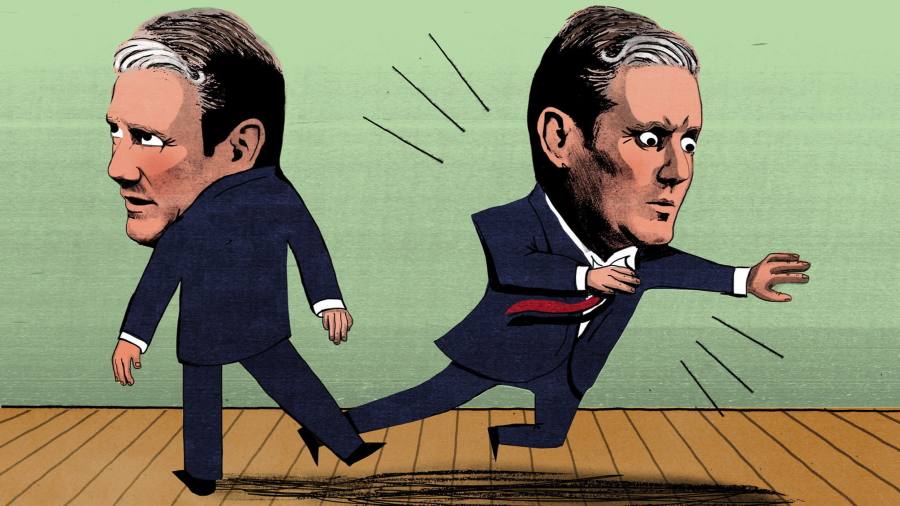
What more does a decent opposition leader have to do, Keir Starmer might well ask. The Conservative government is on its third prime minister this year. It has botched Brexit and announced a “mini”-Budget so disastrous that the necessary correction will see harsh spending cuts and higher taxes. Yet, while Labour enjoys a commanding poll lead over the Tories, Starmer himself is close to neck-and-neck with Rishi Sunak over who would make the best prime minister.
Worse, he trails Sunak on competence, decisiveness and being trusted on the economy. In part, Sunak’s lead over his party reflects relief at the arrival of a serious man after the chaos of the Truss government. It also makes his electoral strategy simple. He must be seen to defeat inflation, which he will blame on the pandemic and Ukraine crisis, and will warn voters not to let Labour endanger a nascent recovery.
But the ratings also illuminate two issues for Starmer. The first is that Labour faces what might be called a progressive penalty. While the right rarely has to prove its credentials on patriotism, law and order or being careful with public money, the left is expected to offer a higher degree of reassurance. This is even more true for a party which so recently succumbed to Corbynism.
The second is that attitudes to the Labour leader are the great variable in the next election. It is entirely possible that the country has already seen enough of the Tories and decided that it is time for a change. But reservations about Starmer are a hurdle. In many ways this is unfair, proof of the absurd emphasis placed on charisma. But it is also a function of a strategic clash between the need to reassure and the need to inspire.
Voters need to see two Starmers, one soothing, one galvanising. The second need not require Oxford Union oratory but does demand a stirring story to tell. While voters see the Labour leader as an honest man, they complain that they still don’t know what he stands for. This exposes him to Tory attack lines — the elitist London Remainer — which in turn undermines the reassurance.
The progressive penalty means the mission to reassure comes first. Tory attacks are easy to predict; that Labour will raise taxes, waste money, be weak on immigration, undermine Brexit and pander to extremists on social issues. It is easy to forget just how much similar issues obsessed Tony Blair in opposition, hence his promises to keep the pound, stick to Tory spending limits and control immigration.
Starmer, whose office and inner circle are filling up with Blairites, is copying this playbook. Meanwhile, campaign organisations such as Labour Together, whose leaders have included key shadow cabinet allies, and the Tony Blair Institute, are also acting as outsourced policy units. Most important, Starmer has ruthlessly purged the hard left, a vital prerequisite to public trust.
To meet a shadow cabinet member is to smell the fear. If Liz Truss’s mantra was growth, growth, growth, Labour’s is safety, safety, safety. Given the need to win back Leave-voting seats, one battle is to control the increasingly assertive Remainers by pushing back against a thirst to rejoin the single market. Other recent interventions have also seen Starmer denouncing Just Stop Oil protesters blocking roads and calling for more NHS jobs to be filled by homegrown staff.
Caution is also the watchword for Starmer and shadow chancellor, Rachel Reeves, as they burnish Labour’s economic credentials. The fact that they would come to power with little money to spend makes this easier in one sense but after the horror-show of September’s “mini”-Budget it also inhibits talk of borrowing to invest.
It is possible that recent Tory chaos means a reassurance strategy is enough. For now, Labour is understandably focused on prosecuting the economic case against the Tories while voters are receptive. New commitments offer new lines of attack. But this leaves too much to chance. So much of the UK needs an overhaul that the party must offer more than managerialism or a kinder Conservatism. There may be little money but people want to hear how Labour will make things better.
What is the possible positive agenda? Labour is committed to a renaissance of social housing. It should also stimulate affordable properties for homeowners. “Homes for our children” is a good slogan highlighting Tory failure. NHS reform, a health service fit for the 21st century, is another platform that plays to Labour’s historic strengths.
Both Gordon Brown and Labour Together are due to deliver proposals on restoring democratic integrity. This issue may be low priority for voters but Labour can argue recent government chaos springs from failings in the political system.
This all feeds into a broader narrative: security in an uncertain world. As one ally puts it: “How can you associate the Conservative brand in the last three years with security and control?” Voters are open to a hopeful vision that offers not just economy security but also in housing, crime, energy and public services. This aligns with the climate agenda and the tech challenge.
Labour is in a good place for now but it needs both a Cautious Keir and a Stirring Starmer working in tandem, not tripping over each other. So far only the first has taken priority, but both are vital and resolving the tension between them may be the key to the next election.